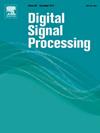基于条件去噪扩散的快速时变MIMO-OFDM系统信道估计
IF 2.9
3区 工程技术
Q2 ENGINEERING, ELECTRICAL & ELECTRONIC
引用次数: 0
摘要
针对快速时变多输入多输出正交频分复用(MIMO-OFDM)系统,提出了一种基于条件去噪扩散的信道估计(CDDCE)方案。该智能CDDCE模型将去噪扩散概率模型(DDPM)巧妙地应用于条件信道状态信息(CSI)的生成,并通过随机迭代去噪过程进行有效的信道估计。具体而言,CDDCE模型利用马尔可夫链,根据高斯正向扩散过程的余弦方差表,逐步将高斯噪声添加到定制预处理的正版CSI中。然后,信道估计从纯高斯噪声开始,通过在不同噪声水平下进行去噪训练的专门U-Net反复细化条件粗略估计的CSI,进行反向迭代细化过程。数值结果表明,我们的CDDCE方案明显优于经典方法和三种基于深度学习(DL)的前沿方法,表明它具有出色的学习无线信道统计特征的能力。此外,我们证明了CDDCE方案对各种信道失真和干扰具有出色的鲁棒性:当(i)导频符号数量有限,(ii)省略循环前缀(CP), (iii)引入剪切噪声,以及(iv)离线和在线信道条件不匹配时。本文章由计算机程序翻译,如有差异,请以英文原文为准。
Conditional denoising diffusion-based channel estimation for fast time-varying MIMO-OFDM systems
We propose an innovative conditional denoising diffusion-based channel estimation (CDDCE) scheme for fast time-varying multiple-input multiple-output orthogonal frequency-division multiplexing (MIMO-OFDM) systems. This intelligent CDDCE model delicately adapts the denoising diffusion probabilistic model (DDPM) to conditional channel state information (CSI) generation and performs efficient channel estimation with a stochastic iterative denoising process. Specifically, the CDDCE model utilizes a Markov chain that gradually adds Gaussian noise to the customized preprocessed genuine CSI according to the cosine variance schedule for the forward Gaussian diffusion process. Then, the channel estimation begins with pure Gaussian noise and repeatedly refines the conditional roughly estimated CSI by a specialized U-Net trained on denoising at different noise levels for the reverse iterative refinement process. Numerical results show that our CDDCE scheme significantly outperforms classical approaches and three cutting-edge deep learning (DL)-based ones, indicating its eminent capability to learn the statistical characteristics of wireless channels. Besides, we demonstrate that the CDDCE scheme exhibits excellent robustness against various channel distortions and interference: when (i) there are a restricted number of pilot symbols, (ii) the cyclic prefix (CP) is omitted, (iii) the clipping noise is introduced, and (iv) the offline and online channel conditions are mismatched.
求助全文
通过发布文献求助,成功后即可免费获取论文全文。
去求助
来源期刊

Digital Signal Processing
工程技术-工程:电子与电气
CiteScore
5.30
自引率
17.20%
发文量
435
审稿时长
66 days
期刊介绍:
Digital Signal Processing: A Review Journal is one of the oldest and most established journals in the field of signal processing yet it aims to be the most innovative. The Journal invites top quality research articles at the frontiers of research in all aspects of signal processing. Our objective is to provide a platform for the publication of ground-breaking research in signal processing with both academic and industrial appeal.
The journal has a special emphasis on statistical signal processing methodology such as Bayesian signal processing, and encourages articles on emerging applications of signal processing such as:
• big data• machine learning• internet of things• information security• systems biology and computational biology,• financial time series analysis,• autonomous vehicles,• quantum computing,• neuromorphic engineering,• human-computer interaction and intelligent user interfaces,• environmental signal processing,• geophysical signal processing including seismic signal processing,• chemioinformatics and bioinformatics,• audio, visual and performance arts,• disaster management and prevention,• renewable energy,
 求助内容:
求助内容: 应助结果提醒方式:
应助结果提醒方式:


